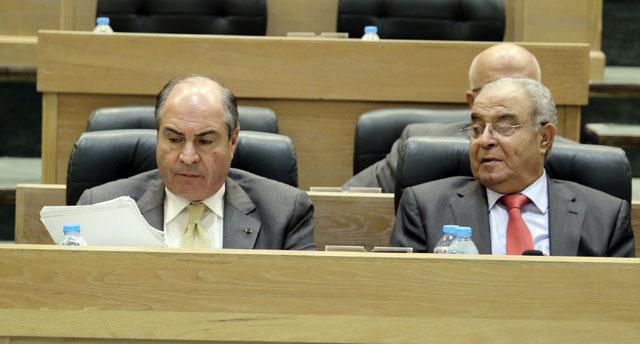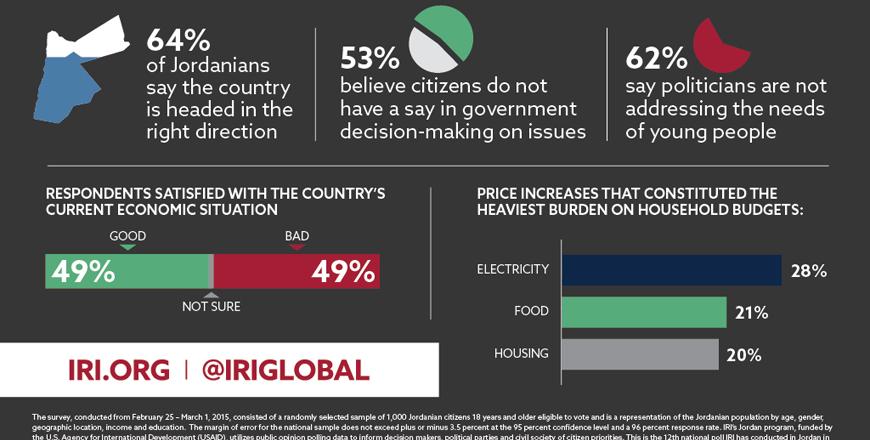You are here
Survey finds growing dissatisfaction with economy among Jordanians
By JT - Jun 21,2016 - Last updated at Jun 21,2016
AMMAN — A new poll has shown a rise in public dissatisfaction with the economy in Jordan.
The survey, released on Monday, was conducted by the International Republican Institute (IRI), a US-based think tank.
“This poll reflects unease among Jordanians just prior to King Abdullah dissolving the Parliament last month,” Scott Mastic, IRI regional director for Middle East and North Africa, said in a statement.
“The Jordanian people’s lack of confidence in the Parliament is something the new government must address in tandem with steps to address the country’s economic difficulties,” he added.
Polling indicates a decrease in the number of people who describe the economy as good — dropping to 29 per cent in the most recent poll from 46 per cent in 2015 —and a parallel rise in the number of respondents who describe it as bad (50 per cent, up from 33 per cent in 2015).
“These economic indicators suggest uncertainty about the future, with respondents split over whether they expect the economy to improve,” a statement by the IRI said.
The latest update of the World Bank (WB) Global Economic Prospects Report, published earlier this month, said Jordan faces ongoing trade and investment challenges, stemming from the conflict in Syria and across the region.
Unemployment remains high, particularly among the youth, according to the WB report, which indicated that the unemployment rate in Jordan rose to 13.7 per cent in the second half of 2015.
Jordan hosts 1.3 million Syrians, of whom 655,000 are registered refugees. Around 85 per cent of the Syrians in Jordan live outside camps.
Public debt rose in each of the last five years in absolute figures; the growth rate of debt was in all these years higher than the growth rate of the gross domestic product (GDP).
This state of affairs caused debt to rise steadily, not only in absolute figures, but also as a percentage of GDP.
In a letter to His Majesty King Abdullah on Sunday, newly appointed Prime Minister Hani Mulki said the government will focus on building investment institutions. It will also use the funds available to encourage young people and entrepreneurs to start small and medium projects to help mitigate poverty and unemployment.
Furthermore, it will work to strengthen cooperation and to build stronger ties with Saudi Arabia and the Gulf countries in economic and investment fields.
Meanwhile, the IRI survey measured Jordanians’ attitude towards the upcoming parliamentary elections and the Kingdom’s intervention against Daesh terror group.
It found that 58 per cent of Jordanians are unaware of the new Election Law and the Independent Elections Commission, and 57 per cent say they are unlikely to vote. However, despite this disengagement with the electoral process, 69 per cent say they cared about political reforms to a large or moderate degree.
The Independent Elections Commission is currently running an awareness campaign to educate the public on the law and the voting process, with focus on attracting youth to participate.
On Daesh, attitudes towards the extremist group were consistent with the results of polling conducted in Jordan by IRI in 2015. Eighty-nine per cent of respondents consider the group to be a terrorist organisation. Support for the international coalition against Daesh is growing — 80 per cent support the intervention to a large or moderate degree, compared with 75 per cent in 2015.
Related Articles
AMMAN — A Centre for Insights in Survey Research opinion poll published on Tuesday revealed an increase in the number of Jordanians pessimis
AMMAN — Around one-third of Jordanians feel they do not have any say in governmental decision making on issues that directly affect them, ac
AMMAN — Jordanians are optimistic about the direction of their country despite mixed attitudes about the economy and emerging concerns about

















